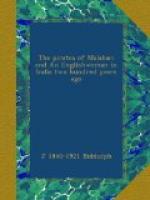As soon as Matthews had returned to Bombay, after the Alibagh fiasco, he applied himself to what, to him, was the principal reason for his coming to India, viz. private trade. For the Company’s interests he did not care a button; in fact, anything that injured the Company found an advocate in him. As for the pirates, if they did not come in his way, he was not going to trouble himself much about them. To enrich himself by starting a private trade of his own, was his one object, and, with this end in view, he sailed for Surat. With him he took Mrs. Braddyll and Mrs. Wyche, with sundry chests of treasure, in spite of Phipps’ remonstrances: the estates of both having been attached by the Council. In Surat he tried to raise a large sum for a venture in the China trade; but the arbitrary conduct of the King’s officers had raised so much distrust among the native merchants, that he was unsuccessful. Within three weeks he was back again in Bombay, and was at once involved in an angry correspondence with the Council. Not confining himself to an acrimonious exchange of letters, he affixed at the sea gate an insulting proclamation. Phipps ordered it to be removed, on which Matthews wrote that, if it were not at once replaced, he would publish it by beat of drum through Bombay, and, should any resistance be offered, he would not leave a house standing in the place. In this dilemma the Council consented to replace it, but, to save their dignity, added a notice that it was licensed by the Secretary. It is difficult to see how this improved the matter. However, Matthews sailed the next day for Madagascar, so no doubt the proclamation did not long remain after his departure.
His absence from Bombay, though doubtless felt as a relief by Phipps and the Council, was probably, before long, a cause of regret in the troubles that shortly beset them: but for the moment we will follow his movements. Not contented with his quarrels with the Council, Matthews was soon at daggers drawn with his own captains. First he proposed to them to employ their ships in trading, on condition that two-thirds of the profits were to be his. The captains refused to have anything to do with the proposal. He had already had a quarrel with Cockburn, his second in command, the first of many that were to follow. Before leaving Bombay, a quarrel arose between him and Sir Robert Johnson, of the Exeter. Johnson threw up his command, and took passage for England in one of the Company’s ships, which was lost with all hands on the voyage. With Sir Robert Johnson, his son, a lieutenant in the navy, perished. Brathwaite was appointed to the command of the Exeter. It had already come to be widely known that anybody who was in trouble with the Company would find countenance and protection from Matthews. He told the Portuguese officials that the Company’s vessels were only traders, and therefore not entitled to a salute, gun for gun. This matter of salutes was a very important one in




